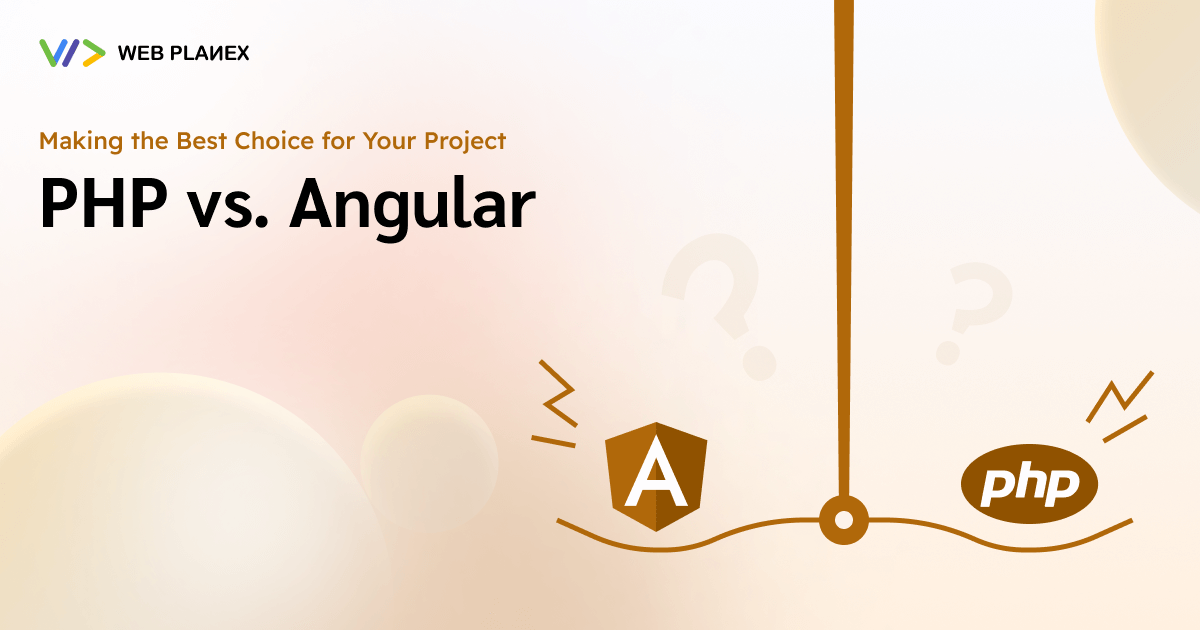
It can be overwhelming to choose which technology to use in your web development project! Especially if you’re a beginner, even for experienced too. Because the outcome will depend on the technology used. Before coming to a conclusion, thoroughly understanding the features and functionalities of each technology is important. You need suitable and reliable technologies for your project. PHP and Angular both are powerful tools in web development and choosing the right one that best suits your needs is crucial.
PHP and Angular both are heavily used technologies and both are vastly different from each other. And it can be a daunting task to identify which one would be a better option for you. That is why we’re here to help you set the record straight. In this post, we will discuss and learn about both technologies and compare them to decide which one should you choose.
Let’s begin!
- Basics and understanding of PHP and Angular
- Comparison between PHP and Angular
- Pro and Cons
- Conclusion
Basics and understanding of PHP and Angular
PHP
PHP which is also known as PHP: Hypertext Preprocessor, is a widely used open-source general-purpose scripting language that is especially suited for web development. A study on web technologies shows that PHP is a very popular choice, powering nearly four out of five websites (76.1%). It is a server-side scripting and it can be embedded into HTML. It’s a backend framework that runs in the back of a web or app hidden from users.
PHP uses multiple features:
Flexibility
PHP scripts can run on any device – PC. smartphone or tablet. Because of its vast compatibility, it can be easily integrated into XML, HTML, and JavaScript. It is also compatible with almost all servers.
Simplicity
One of the best things about PHP is that it is easy to learn even for beginners. It comes with a lot of predefined functions and it is a well-organized and easily optimizable programming language. There is no need to include libraries in PHP like C.
Interpreted Language
Due to it being an interpreted language, there is no need for compilation. Interpreters execute source code themselves, and due to that code becomes platform-independent.
Objective Oriented
Object-oriented features help in building complex reusable web pages, which makes PHP comparable to powerful object-oriented languages like Java and Python. The object-oriented features were added in PHP5. These features include data encapsulation, inheritance, abstraction, polymorphism, etc.
Open-Source
There is no hassle to get a license to use it. Due to PHP being open-source, it is free so there’s no load on your wallet to use it.
Platform Independent
You can run PHP on any device and operating system (Microsoft Windows, macOS, Linux, RISC OS, or Unix). Its cross-platform compatibility makes it really popular amongst its users as it saves a lot of time and energy. We can easily connect it with various databases and is also compatible with almost all web servers used today (Apache, IIS, and others).
Case Sensitive
PHP is a partially case-sensitive language. All things in PHP are case-sensitive except function names.
Case-sensitive things in PHP:
- Variable names
- Constructs (if, if-else, while, do-while)
- Keywords (such as true and false)
- User-defined functions and class names
- Handling and Reporting Errors
PHP is equipped with numerous built-in functions and predefined constants that identify runtime errors. Similar to Java and C#, PHP5 supports error handling techniques using keywords such as try, throw, and catch. In PHP5, there are 16 error levels that describe the type and severity of errors. Moreover, managing error reporting in PHP is straightforward with the use of the error_reporting() function.
Angular
Built by Google and a large community, Angular (also known as Angular 2+) is a free and open-source framework written in TypeScript. Designed for single-page web apps, it’s a complete revamp of the earlier AngularJS framework. Angular boasts a thriving community of over 1.7 million developers, along with library creators and content makers. Surveys show it’s one of the most popular web frameworks, on the same level as React.
Angular Features:
Scalability
It is a highly scalable framework. Due to being highly scalable, it helps developers meet massive data requirements.
Testing
Angular’s dependency injection makes testing easier. You can provide fake data or simulated responses to your code, instead of relying on real servers or external sources. This lets you focus on how your code behaves with different inputs.
Integrated features
Angular provides pre-made building blocks like navigation, buttons, layouts, and data tables. This makes it simple to design user-friendly app interfaces and build applications similar to Gmail, Android, and Google Drive.
Output quality and processing time
Angular makes building web apps faster and smoother. It simplifies code by turning designs into efficient instructions for browsers and lets you get started quickly with just HTML and CSS. This approach also helps search engines understand your app better, and Angular’s built-in routing ensures fast loading times by only loading the necessary code.
Compatibility across different platforms
Applications and websites can be developed for various platforms including mobile and desktop, as well as operating systems such as Windows, Linux, and Mac.
Utilizing existing code
Due to it stores previously used codes, you can get things done quicker and move your project forward faster.
Comparison between PHP and Angular
We have learned about both PHP and Angular, their functionalities, and features, and a basic introduction to what both technologies are. Now it’s time for a detailed comparison to get an idea of which language is suitable for your specific needs.
We are gonna break down the differences between these two, and here are some main differences you need to focus on:
Security
This is the most important aspect to look towards as it is completely crucial to protect your apps and sites from cyber attacks.
PHP
In terms of security, PHP might be a little backward in comparison to angular. However, following best practices can lessen the risk of security threats.
In PHP, ensuring security involves the adoption of various methods and technologies to address potential vulnerabilities in server-side scripting and website creation. This encompasses techniques for validating user inputs, managing database interactions securely, guarding against SQL injections, and adhering to established secure programming practices.
Angular
Angular utilizes TypeScript to enhance security significantly. Whether a value is being inserted into the DOM through properties, styles, attributes, interpolation, class bindings, or templates, Angular actively purifies these untrusted values by default to ensure they are safe for insertion.
Additionally, Angular safeguards applications against various attacks and security threats, including XSS (Cross-Site Scripting) and HTTP vulnerabilities, providing methods to counteract them. It implements a Content Security Policy (CSP) and adopts Trusted Types to block XSS attacks. Users can also contribute to improving Angular’s security by reporting any vulnerabilities directly to the Angular team.
Debugging
PHP
PHP can be a bit tough to debug as a server-side programming language. It is a lengthy and time-consuming process for a PHP developer. Even so, PHP offers some debugging programs such as ZendDebugger and Xdebug to make your life easier. There are other methods to perform debugging in PHP such as integrating PHP debuggers with CLI or IDE.
Angular
It offers plenty of tools and technology for debugging, such as Angury, the debugger statement, ng probe, profiler, and editors and IDEs such as WebStorm and VS Code.
It is comparatively easier to perform debugging in angular than in PHP. It’s less time-consuming and the tools are efficient.
Scalability
Angular and PHP both possess the ability to scale effectively.
PHP
At times, PHP might experience slowdowns, especially when processing large volumes of data or under heavy user traffic. Implementing data caching techniques and using a PHP accelerator are two effective strategies to enhance the performance of PHP.
However, the particular metrics for performance will differ depending on the intended application and the context in which it is used. It is essential to carefully evaluate the needs of your application to select the most appropriate solution.
Angular
Angular surpasses PHP when it comes to both performance and scalability. Angular has built-in speed enhancement features, lazy loading, and AOT. It can be a fine choice for high-performing Apps, it is designed to be swift. It is designed to manage massive Apps. For example, Netflix is an Angular Application.
Learning Path
PHP
PHP is comparatively easier to learn as it is uncomplicated, even for beginners. With its vast collection of built-in functions and clear syntax, developers can jump right into web development. Due to interacting well with other languages such as HTML, Javascript, and CSS, PHP makes it efficient for developers to develop applications.
Angular
Angular is a full-fledged framework, hence it can be a bit complex to learn. For beginners, it can be more challenging to adapt to such a vast language while programming. However, it’s a powerful framework that can handle complex web applications in the hands of developers who understand its core concepts and way of writing code.
Threading
PHP
PHP is a programming language that supports multi-threading, enabling it to execute several tasks simultaneously. Additionally, PHP offers an object-oriented API known as “pthreads” which offers various tools essential for multi-threading. Alternatively, the “parallel” library can also be utilized for this purpose. Therefore, PHP applications have the capability to efficiently manage the reading, writing, creation, synchronization, and execution of Threads, Threaded Objects, and Workers. A good example for this is Facebook.
Angular
Angular does not utilize threads to structure your code or to execute multiple processes simultaneously. Rather, it operates on the client side within a browser, utilizing JavaScript for its functionality.
To implement threading in your project, consider utilizing web workers. These are essentially background threads that operate alongside the main threads, tasked with handling intensive computations and thereby enhancing the performance of the application. Web workers can be integrated into your environment using the Angular CLI which allows for seamless collaboration and management.
Pro and Cons
PROS
PHP
- PHP is simpler to learn and its features are easy to comprehend.
- Due to having a large community, PHP has a magnificent amount of resources online.
- Due to not being complex development through PHP is really quick.
- It works with almost every OS and browser. In addition, databases: MySQL and PostgreSQL are supported.
Angular
- Angular serves as an effective framework for web development projects, providing a variety of features. It is supported by a vast array of tools and libraries that streamline the development workflow.
- Angular’s strict structure for organizing code simplifies the understanding, maintenance, and troubleshooting of the codebase.
- In Angular’s vibrant and expansive community, developers find it easy to access support, resources, and instruction.
- Angular is optimized for performance, adeptly managing complex applications and large datasets, despite slow load times, through its advanced compilation techniques and robust performance attributes.
CONS
PHP
- One of the major concerns about PHP is security. It is more prone to cyber-attacks. Due to its popularity hackers can easily crack into your code.
- PHP can make codes massey if worked on high-end complex projects. Making it even harder to maintain and debug.
- Due to being a server-side programming language, it may face a barrier to being used in some projects.
Angular
- While Angular primarily utilizes dependency injection, this approach might seem confusing to some developers. Successfully implementing it can be challenging and requires a deep understanding of both the architecture and its deployment.
- Angular undergoes constant updates, which can sometimes cause older versions of the framework to become obsolete. This can pose challenges for developers who are required to maintain legacy applications.
- Due to the extensive code generated by Angular, applications might become slow to load. Nonetheless, strategies such as implementing lazy loading or minimizing the amount of code can help mitigate these issues.
Conclusion
Choosing between PHP and Angular doesn’t always have to be an either-or situation. Sometimes, using them in conjunction can yield better project outcomes. For instance, Angular can be used to build a responsive front-end user interface, while PHP handles the back-end services and database interactions.
Remember, the right choice depends on what you need for your specific project. For projects that need rapid development cycles and a focus on server-side coding, PHP is often the preferred technology. It works well with a variety of web servers and databases, boasts a strong community of developers, and offers a vast ecosystem of frameworks. On the other hand, Angular is suited for developing applications with sophisticated user interfaces and high interactivity. It provides modern aesthetics, presents a significant learning curve, and contains advanced features necessary for creating dynamic and scalable web applications.
Ultimately, the decision to use PHP or Angular should be driven by the detailed needs of the project. Evaluating the pros and cons of each technology carefully is crucial. By considering these factors, developers can select the most suitable technology for their projects and pave the way for their successful execution.




